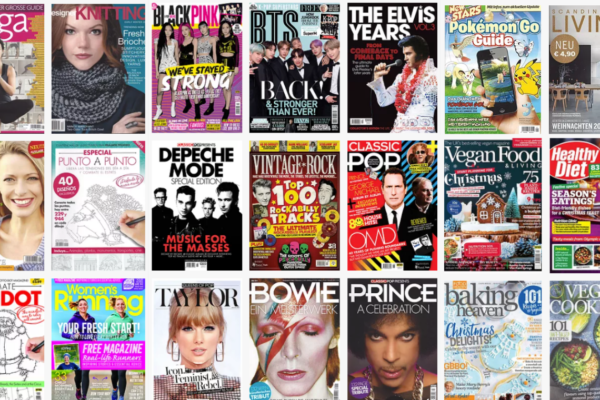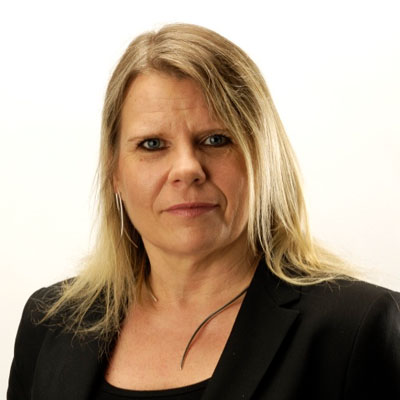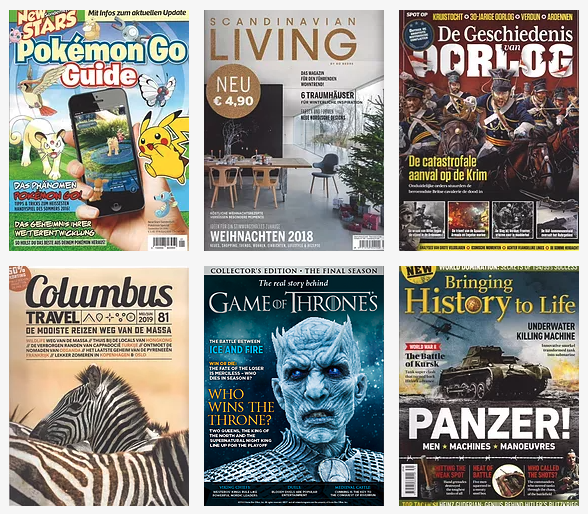|
Getting your Trinity Audio player ready...
|
Licensing content for use in other countries seems like an obvious way for media companies to leverage their existing editorial to create new revenue streams. Yet extending content reach in this way is not always straightforward.
In a fascinating interview Regina Erak, the Managing Director of Erak Global Works Limited, an agency that focuses on licensing and media translation solutions, highlights some of the barriers that publishers need to overcome, from focusing too heavily on localised content through to recycling content at unacceptable levels.

Here she not only points out some of the issues that publishers face, but also highlights the key opportunities that both licensing and content creation on a global scale can create. She also discusses how small and medium-sized media companies are innovating in licensing delivering authoritative global-ready content.
Can you explain what your role is at Erak Global Works and what your day to day job entails?
I am the founder and managing director of Erak Global Works (EGW). I work in many “roles” and my daily job is varied and quite complex. Aside from the administrative duties of running the business and some “individual contributor” tasks, I am fully focused on communications and teamwork and finding solutions for our clients and partners. Though the business and the deadlines are complicated, our company mission is simple: we deliver top quality results for our clients on time – every time.

My days are always full and my first focus during business hours is to continuously connect with my clients and partners. We work in a time sensitive business and there is no room for delays or mistakes. Our clients rely on us to sell and source and create and translate top quality content worldwide and it is a very dynamic environment. Further to actively serving all of our longtime clients, I am always working on business development and we are evaluating new opportunities every week.
In addition to account management and business development, I invest the majority of my time liaising with our diverse global teams so our projects stay on track and on time. When working remotely across 24 time zones it is essential to maintain a continuous dialogue and to share best practices and action points in a 360 degree fashion. I do not believe in top-down strategies for small teams and I do not want to work with ‘soldiers’ who simply follow orders. I have worked hard to develop a diverse and collaborative team culture where all contribute and have good ideas; and that’s what has fuelled our growth.
Though our core business has been based in the EU and the UK, we are seeing significant growth in the US and as far east as Asia so my “working hours” seem to be almost around the clock. Sleep is almost always in short supply.
International market research is a new business area has formed recently and I see that as a rising star of the future.
There are several different parts to your business. Which area has seen the biggest growth in recent years?
EGW deals with licensing (and syndication), media translations for magazines and websites, and content creation. They all are expanding, though not always at the same time. We have noticed an influx of licensing enquiries during the pandemic as publishers are losing staff and are in need of new income streams. Content creation is similar: editorial teams are getting smaller and have more pressure. Some publishers feel they should publish their own materials abroad but they do not understand the market or the culture and language. It is difficult to succeed unless you have solid local knowledge and quality in-country staff, but EGW makes it easy. We help publishers make the most of their content through licensing and syndication but even greater opportunities exist beyond the traditional models. We specialise in doing things differently and creating new revenue streams with novel print and digital products that are unique to each market.
International market research is a new business area has formed recently and I see that as a rising star of the future. We have just conducted a detailed study of the craft market and this is something that will be of more relevance. We can combine research with solid business recommendations and create an effective business plan because we understand all three areas: foreign culture, markets and publishing. This sets us aside from other research companies. We are totally dedicated to the media business.
What do you see as the key opportunities and the challenges in ‘internationalising content’ at the moment?
School books teach you to ‘think global but act local’. However, large publishers in the UK who once were leaders in global content creation seem to do the opposite these days. Their content is often much too local and cannot be used abroad. If you live in Paris, you may not care about UK entertainment or the Royal Family – you are in need of content that matches your cultural blueprint which is often missing. The licensee then has to create that content themselves, adding to the cost line. It makes licensing far less appealing to many publishers.
Furthermore, many publishers often opt for low-cost stock photography pictures for which global publishers are not willing to pay premium prices; and I think that is understandable. There is a gap between the business needs of publishers and that of photo agencies. As the publishing industry faces decline, picture agencies need to rethink their strategies and adjust their unrealistic pricing models. As editorial content suffers as a result, the industry as a whole is winding itself down faster than it needs to.
In addition, UK publishers are recycling their content too much; at least from an international viewpoint. You cannot really expect the same fees for already published content (often six times…) that you are selling to a licensee twice in the hope he doesn’t notice… Medium-sized publishers often produce better content as they still follow the traditional publishing route; and their results show. Just look at Vegan Food and Living by Anthem. It’s vegan through and through. All staff are vegans and they simply know their stuff. The magazine is the leading voice for people who are serious about vegan. It shows that a magazine can command a large audience even these days.

Larger publishers often just become ‘me-too’ publishers these days; and that is very sad. That said, Martha Stewart have just introduced a line of bookazines and they are simply beautiful. It took them almost four months; every little detail was crafted and placed a number of times until it was just right. The result is a very convincing new line of magazines perfectly tailored to today’s consumer needs.
The bigger opportunity for publishers these days is thinking outside of traditional publishing routes. Retailers, for example, become publishers but they lack the experience how to create good copy.
Are there any geographical regions that you believe will offer significant growth in the future?
I am not sure that simply shifting to other countries is the answer to our prayers. We have seen the rise and fall of the Russian magazine market. We have seen Asia emerging and buying magazine licenses. However, it will still take Asia a long time to catch up properly with Europe when it comes to publishing. Asia needs luxury content, but they want Asian looking people modelling those garments. Fashion houses have responded and moved their big shows to Asia. Europe, however, is tired of luxury and wants to revert to a more meaningful and fulfilling lifestyle. Mindfulness is not that attractive to Asians – yet that’s what’s selling here. European publishers often do not have the content Asians need. And if they do, then it is a big question mark how much they will pay for it and if they will pay for it at all. We have to follow Asia going through their life cycles and be there when they are ready.
The bigger opportunity for publishers these days is thinking outside of traditional publishing routes. Retailers, for example, become publishers but they lack the experience how to create good copy. There are manifold opportunities outside the normal distribution chain via traditional news sellers. Just look at the emergence of funzines, magalogues, etc. In my opinion, this is where real growth will be coming from. Many guilds publish their own magazines for members; many are leaders in their field with six digit print runs. Advertisers love this.
Another important area of growth is syndication. The Content Exchange (TCE) have built a syndication platform for publishers to offer their content to other publishers. Very easy to use; the publisher stays in control and sets the price. Many publishers don’t want to reinvent the content wheel and use content that is already there. There is massive pressure on delivering budgets and not enough money to do it well. TCE have solved this problem. It is cost-effective and offers a new revenue stream. Everybody wins in this scenario; it’s a large international content pool where content buyers become content sellers and vice versa. A true marketplace for editors, publishers, and freelancers alike. Contact me for more information or how you can monetise your own content with TCE.
How has the pandemic impacted your business? Has it changed the way that you operate?
EGW has been very busy during the pandemic; something I do not take for granted. It absolutely breaks my heart thinking about how the pandemic was handled by politicians worldwide. Some publishers lost 100 per cent of their income overnight when the lockdown was imposed. We all have a duty to help where we can; and EGW will be no different. We are all in this together. As an international agency, we can marry content with publishers from other countries. So you could say it made us more humble and appreciative of our clients. Thank you for sticking with us!
We couldn’t travel during the lockdowns and I have to say, I booked the first flight as soon as I could. You might argue that we have all proven we can work from home just fine. I would argue the exact opposite! Working from home is not for everyone. I noticed that motivation faded and things took far longer than they took people in the office. I tried to get a telephone appointment with a company, which took them over two months to implement. No company can sustain that in the long run. As a commercially minded person, I do not believe that you can get the same results in an online conversation that you achieve face to face. It might work for simple work tasks and processes but not in a sales-driven environment. I have spoken to many publishers and most were not overly keen to allow staff to keep working from home due to the lack of efficiency. Time will tell how businesses achieve the best productivity balancing in-office versus work from home strategies.
We are a long way away from machine translations for media that require no rewriting by a human.
Are you using automated technologies like machine learning yet? Is there likely to be a role for this type of technology in your business in the future?
I am always following what’s new on the market and how we can make use of it. Our aim is to become more efficient whilst maintaining excellent quality for our clients. There is much noise about translation engines and they have come a long way. However, most people do not speak other languages and do not understand what a translation engine can and cannot do. As a linguist with 10 languages, I am well aware of the pitfalls of such translations. They all follow an algorithm that looks OK at first glance but then becomes repetitive very fast, with overly long and complicated sentence structures. You will get frustrated with the text, it simply doesn’t flow and it doesn’t read well. We are a long way away from machine translations for media that require no rewriting by a human.
Another misconception is that you can just run a magazine through a translation engine and have a print-ready copy at the end of it. This makes a total mockery of any editor who has perfected his skill and experience through years of hard work. If you have ever produced a magazine, you will know that it takes a long time just to research facts and ensure they are correct and adjusted to a local audience abroad. Things like humour (a typical issue with British magazines) simply doesn’t always travel well and can cause serious problems. Advertisers in Germany got very disgruntled and withdrew funds when their camera was translated with ‘it feels like a slippery soap’. An editor would have spotted this immediately as this makes no sense in German and just sounds foreign.
So for EGW, we do not use translation engines. Besides, some bookazines are so specialised that you cannot even use ordinary translators for such subjects. They need to be experts in their fields. We translate some history magazines, and the staff doing it are studied historians who understand and know the name of every single weapon and its components used in past wars. A translation engine cannot deliver that; and it cannot write well either.

Where do you see Erak Global Works five years from now?
I see Global Works in various locations with satellite offices. I see content production on demand for third parties growing and I would love to see us offering sales solutions for clients to tap into that expand their reach and offer serious alternatives to the shrinking newsstand. We are so much more than a licensing agency – we can and will grow your international business. 2021 will see a larger office in Germany so that we remain accessible for Europe and the UK. We already have an office in Seattle and will see expansion into that area, too. EGW just turned five years and we have already accomplished so much in such a short amount of time. I look with confidence into the next five years.
Ashley Norris


